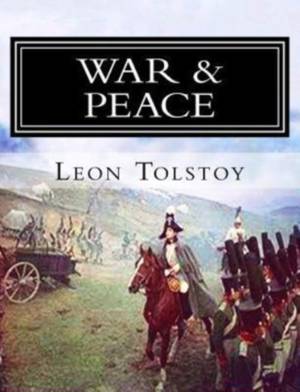
- Afhalen na 1 uur in een winkel met voorraad
- Gratis thuislevering in België vanaf € 30
- Ruim aanbod met 7 miljoen producten
- Afhalen na 1 uur in een winkel met voorraad
- Gratis thuislevering in België vanaf € 30
- Ruim aanbod met 7 miljoen producten
Zoeken
War and Peace
Volume-I
Paperback | Engels
€ 60,95
+ 121 punten
Omschrijving
Tolstoy incorporated extensive historical research. He was also influenced by many other novels. A veteran of the Crimean War, Tolstoy was quite critical of standard history, especially the standards of military history, in War and Peace. Tolstoy read all the standard histories available in Russian and French about the Napoleonic Wars and combined more traditional historical writing with the novel form. He explains at the start of the novel's third volume his own views on how history ought to be written. His aim was to blur the line between fiction and history, in order to get closer to the truth, as he states in Volume II.The novel is set 60 years earlier than the time at which Tolstoy wrote it, "in the days of our grandfathers", as he puts it. He had spoken with people who had lived through war during the French invasion of Russia in 1812, so the book is also, in part, accurate ethnography fictionalized. He read letters, journals, autobiographical and biographical materials pertaining to Napoleon and the dozens of other historical characters in the novel. There are approximately 160 real persons named or referred to in War and Peace.Plot summary: War and Peace has a large cast of characters, the majority of whom are introduced in the first book. Some are actual historical figures, such as Napoleon and Alexander I. While the scope of the novel is vast, it is centered around five aristocratic families. The plot and the interactions of the characters take place in the era surrounding the 1812 French invasion of Russia during the Napoleonic wars.Book/Volume OneThe novel begins in July 1805 in Saint Petersburg, at a soiree given by Anna Pavlovna Scherer-the maid of honour and confidante to the queen mother Maria Feodorovna. Many of the main characters and aristocratic families in the novel are introduced as they enter Anna Pavlovna's salon. Pierre (Pyotr Kirilovich) Bezukhov is the illegitimate son of a wealthy count, an elderly man who is dying after a series of strokes. Pierre is about to become embroiled in a struggle for his inheritance. Educated abroad at his father's expense following his mother's death, Pierre is essentially kindhearted, but socially awkward, and owing in part to his open, finds it difficult to integrate into Petersburg society. It is known to everyone at soiree that Pierre is his father's favorite of all the old count's illegitimate children.Also attending the soireé is Pierre's friend, the intelligent and sardonic Prince Andrei Nikolayevich Bolkonsky, husband of Lise, the charming society favourite. Finding Petersburg society unctuous and disillusioned with married life after discovering his wife is empty and superficial, Prince Andrei makes the fateful choice to be an aide-de-camp to Prince Mikhail Ilarionovich Kutuzov in the coming war against Napoleon.The plot moves to Moscow, Russia's ancient city and former capital, contrasting its provincial, more Russian ways to the highly mannered society of Petersburg. The Rostov family are introduced. Count Ilya Andreyevich Rostov has four adolescent children. Thirteen-year-old Natasha (Natalia Ilyinichna) believes herself in love with Boris Drubetskoy, a disciplined young man who is about to join the army as an officer. Twenty-year-old Nikolai Ilyich pledges his love to Sonya (Sofia Alexandrovna), The eldest child of the Rostov family, Vera Ilyinichna, is cold and somewhat haughty but has a good prospective marriage in a Russian-German officer, Adolf Karlovich Berg. Petya (Pyotr Ilyich) is nine and the youngest of the Rostov family; like his brother, he is impetuous and eager to join the army when of age. The heads of the family, are an affectionate couple but forever worried about their disordered finances.At Bald Hills, the Bolkonskys' country estate, Prince Andrei departs for war and leaves his terrified, pregnant wife Lise with his eccentric father Prince Nikolai Andreyevich Bolkonsky and devoutly religious sister Maria Nikolayevna Bolkonskaya.
Specificaties
Betrokkenen
- Illustrator(s):
- Vertaler(s):
- Uitgeverij:
Inhoud
- Aantal bladzijden:
- 652
- Taal:
- Engels
Eigenschappen
- Productcode (EAN):
- 9781502530110
- Verschijningsdatum:
- 27/09/2014
- Uitvoering:
- Paperback
- Formaat:
- Trade paperback (VS)
- Afmetingen:
- 189 mm x 246 mm
- Gewicht:
- 1148 g

Alleen bij Standaard Boekhandel
+ 121 punten op je klantenkaart van Standaard Boekhandel
Beoordelingen
We publiceren alleen reviews die voldoen aan de voorwaarden voor reviews. Bekijk onze voorwaarden voor reviews.










